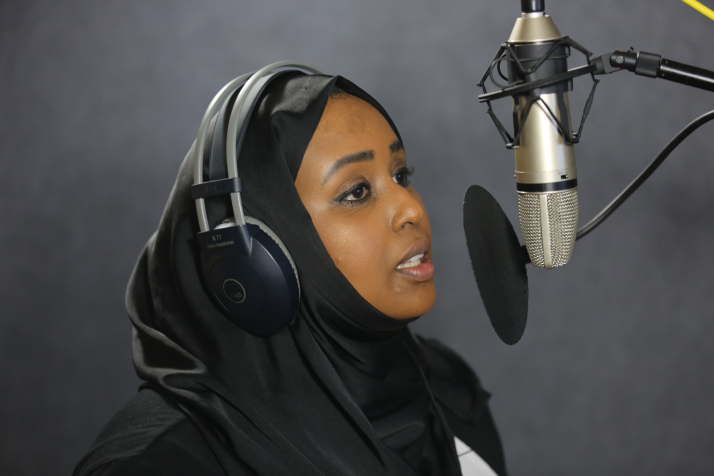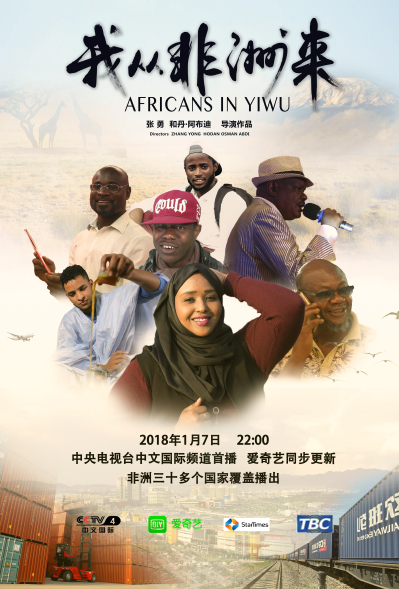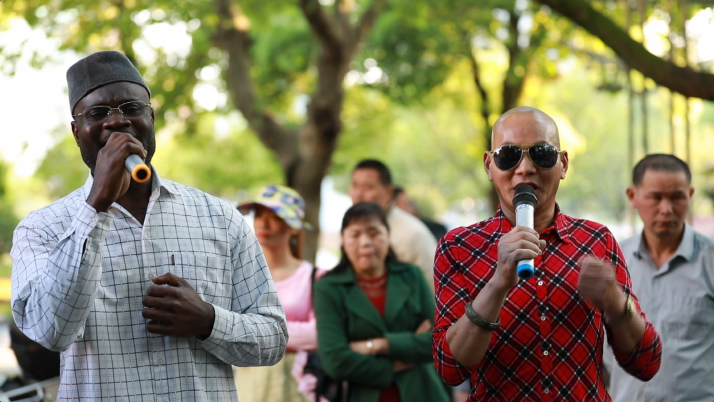|
||||||||||
| Home Nation World Business Opinion Lifestyle ChinAfrica Multimedia Columnists Documents Special Reports |
|
||||||||||
| Home Nation World Business Opinion Lifestyle ChinAfrica Multimedia Columnists Documents Special Reports |
| ChinAfrica |
| Telling Their Own Story |
| Documentary gives a human face to the large African community living in Yiwu, east China |
| By Li Xiaoyu | VOL.10 February 2018 ·2018-02-12 |

A documentary charged with emotion is set to help change the Western world's view of Sino-African relations. Incorporating dreams and joy, love and strength, and inevitably tears, Africans in Yiwu is the first documentary co-produced by a transnational team from China and Africa, which tells the stories of the second largest African community in China.
Launched at the beginning of 2018 on China Central Television (CCTV), the documentary uses simple human stories to portrait the African diaspora in Yiwu, a city in east China known as the biggest small commodity wholesale market in the world.
At the documentary launch ceremony, held in Beijing on December 28, 2017, Somalia's Ambassador to China, Yusuf Hassan Ibrahim, said "the documentary succeeds in telling the real stories of success and efforts of Africans living in China from an African perspective." He sees the film as a game changer in shaping how the China-Africa partnership is seen from a global perspective. The three-hour documentary series is presented in six episodes. For two years, the production team followed the lives of 19 African nationals from 14 countries living in and around Yiwu. The film was produced by the Center for African Film and Television Research (CAFTR) at the Institute of African Studies of Zhejiang Normal University with a budget of approximately 300,000 yuan ($46,000).

The poster for the documentary Africans in Yiwu
A neutral stand
In recent years, China and Africa have increased their media cooperation by strengthening their respective presence in each other's audiovisual content markets. In the wake of this growing momentum, the CAFTR was created in December 2015 as the first Chinese research institution specializing in African television and cinema. The objective, according to CAFTR Deputy Director, Somalia-born Hodan Osman Abdi, also the co-director of the documentary, is to use the power of filmmaking to promote reciprocal understanding of each other through a shared Chinese and African vision. It is in this spirit that the first CAFTR-produced documentary was born. According to CAFTR Director Zhang Yong, who also co-directed the documentary, while African presence in China has been the subject of much discussion, the topic has sometimes been discussed from a negative viewpoint.
"Yiwu is home to thousands of African traders who have come here to build a better life in a foreign country. Their stories, full of positive energy, should be documented in a neutral and objective way. It is wrong to focus only on the negative aspects when talking about their lives," Zhang said.
As the opening lines of the theme song for Africans in Yiwu says, My dream is yours, your dream is mine. You want happiness, and so do I. We are all the same.
Abdi believes that it is this realistic approach to the human elements in the story that will help set the record straight on many misconceptions about the African community in China and its relationship with local people. Moreover, she also considers that the film will be an effective way to bring a more intimate perspective of Africans to the Chinese public. According to her, the majority of Chinese still have a limited understanding on the African continent, its people and their cultures.
"Driven by the Belt and Road Initiative, China-Africa cooperation keeps growing. This makes a better understanding between peoples more needed than ever before," she said.

Serge Hevre who features in the documentary Africans in Yiwu, sings in a public park in Yiwu
African voice
One of the main features of the documentary lies in its "direct cinema" approach, in which there is no voice-over narration. "We wish to let Africans tell their own stories in China to show their everyday life as it really is. The voice of Africans has long been absent from the global media and film scene. This time, we want to make their voices heard," explained Abdi.
However, documenting real stories is not an easy task as it is impossible to summarize them honestly without fully understanding them. That is why the production team started shooting as early as 2016, following the main characters in Yiwu for two years, in order to really understand how they feel and what they strive for.
After contacting more than 50 individuals, the team ultimately selected 19 of them. "We needed characters that are representative, expressive and available at the same time. This complicated the process," said Zhang.
In addition, most of the selected characters speak Mandarin fluently, showing Africans' efforts to integrate into the local community, according to Abdi. "Whatever background or country they come from, the main characters all have things in common, like a strong spirit of resilience," she said. The six episodes of the documentary, each with its own theme, cover a wide range of topics ranging from business and social life, to inter-marriages, education, food and arts. "We want to focus on personal stories that highlight universal elements and values," said Zhang.
The documentary was screened at the 2017 Zanzibar International Film Festival in Tanzania, and was chosen as the opening film of the 2017 Lusaka International Film Festival in Zambia. "In both festivals, our film was highly appreciated by the Chinese, African and Western critics," said Abdi.
Africans in Yiwu is only the beginning for the CAFTR. At the end of December 2017, Zhang Yong and his team went to Africa to shoot a new documentary, this time on the legendary Tanzania-Zambia railway.
Comments to lixiaoyu@chinafrica.cn
|
||
| About Us | Contact Us | Advertise with Us | Subscribe |
| Copyright Beijing Review All rights reserved 京ICP备08005356号-5 京公网安备110102005860号 |